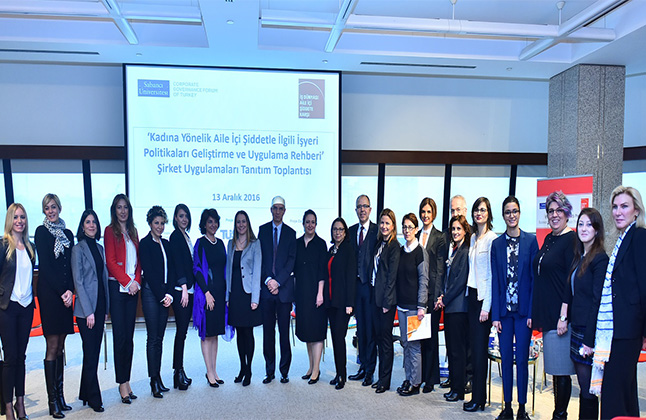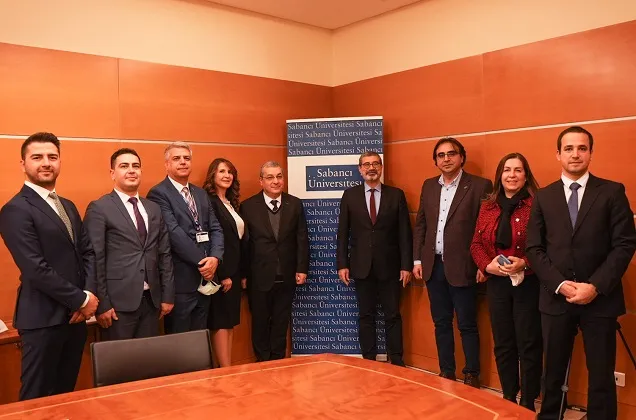28/12/2016
The Sabancı University Corporate Governance Forum, in association with TÜSİAD and with the support of the UN Population Fund (UNFPA) and Sabancı Foundation, had issued a "Business Against Domestic Violence Policy Development and Implementation Guide" to help women take action against systematic pressure and violence they encounter at home or in their close relationships. A Business Against Domestic Violence Policy Development and Implementation Guide Introduction Meeting was held at the Sabancı Center on Tuesday, December 13, 2016 for Sabancı University and the 16 companies that developed their own policies in 2016 using the Guide to share their results with the public.

The International Labor Organization (ILO) also attended the meeting where companies that used the Guide to develop and implement their own policies were disclosed and the process and content of their company policies were discussed.
Introductory remarks were made by Sabancı Üniversitesi faculty member and Corporate Governance Forum Director Melsa Ararat, UNFPA Turkey Representative Karl Kulessa and TÜSİAD Board of Directors Member Erol Bilecik. The keynote speaker was International Labor Organization (ILO) Program Officer Özge Berber Ağtaş.

Sabancı University Corporate Governance Forum Director Melsa Ararat said: "We were delighted that the pilot implementation of our guide was supported by at least one company from all major conglomerates in Turkey. The results achieved by these pioneers will encourage others to participate, and help to expand the support network provided by employers to women who are subjected to oppression and violence. The interest in the project underpins the vital importance of partnership between universities, private companies and international institutions in finding solutions to the most pressing problems of the society."

UNFPA Turkey Representative Karl Kulessa stated, “Violence and discrimination against women, as a product of the overarching male-dominant system, rears its head in businesses as well. Preconceptions about women prevent them from entering the workforce in the first place, while those that do are prevented from taking part in decisions and advancing in their careers. One of the greatest threats to women is domestic violence. Domestic violence has a profound impact on the professional lives of women. Therefore, it must be said that the private sector plays a vital role in combating domestic violence against women. Acting on the knowledge that development is not possible without women, UNFPA supports the private sector in preventing domestic violence against women, as it does in every area."

TÜSİAD Board of Directors Member Erol Bilecik spoke: “The society as a whole has to act in order to adopt a policy of zero tolerance to violence against women. It must be our tenet to protect the rights of women subjected to violence, and accept no excuse on the part of the offender. As TÜSİAD, we support the ‘Business against Domestic Violence’ project. We must leverage the transforming power of business to activate our institutional capabilities against violence as something that detracts from the professional lives of our woman employees. I commend the companies that piloted the "Business Against Domestic Violence Policy Development and Implementation Guide" implementation. I hope that we can work as a whole to create an environment where women live in safety, are empowered, and thus empower society."

International Labor Organization (ILO) Program Officer Özge Berber Ağtaş said, "In the 2016 International Working Conference, ILO began the process for establishing standards on 'Violence and Harassment against Women and Men in Business', which will pave the way for the first discussions on possible international instruments or bodies. Domestic violence is a form of gender-based violence. Governments, employer's and worker's associations recognize the human suffering and loss of efficiency caused by domestic violence. The worldwide cooperation needed to achieve the target of eliminating domestic violence extends to the world of business as well, and ILO is committed to eliminating all forms of violence from the workplace.
The speeches were followed by a panel discussion on "Business Against Domestic Violence Policy Development and Implementation Guide" Pilot Implementation. The panel discussion was moderated by TÜSİAD Gender Equality Working Group President Nur Ger. Speakers were Aras Kargo Corporate Communication Manager Deniz Can, Aygaz Corporate Communication Manager Rişe Özkan, Erdemir Group Human Resources Director Melda Garipağaoğlu Şahin, Doğuş Group Human Resources Division Lead Ebru Esmen Mete, Ericsson Human Resources Director Selen Zarakol, İnci Holding Academy Manager Füsun Toros, İpekyol Operational Development Head Şefi Hacer Güler Akdeniz, Organik Kimya Human Resources Director Asuman Yorulmaz, Sabancı University Center for Individual and Academic Development Director Arzu Bolgül, Siemens Turkey Human Resources Director Nurer Yüksel, Sun Tekstil-Ekoten Human Resources Manager Deniz Köksal, TAV Group/Havaş Management Systems Manager Başak Helen Taşkan, and Yeşim Tekstil, Yeşim Academy Director Özlem Şenkoyuncu. Nur Ger introduced the panel, saying "We are here to learn about the best practices of pilot companies in the TÜSİAD-supported Business against Domestic Violence Project. Women may be subjected to domestic violence in any area. Eliminating this violence will only be possible when all our businesses follow in the footsteps of the pilot companies here. The emerging value in Turkey must be the empowerment of women."
The meeting concluded with closing remarks by Sabancı University Corporate Governance Forum Director Melsa Ararat.









